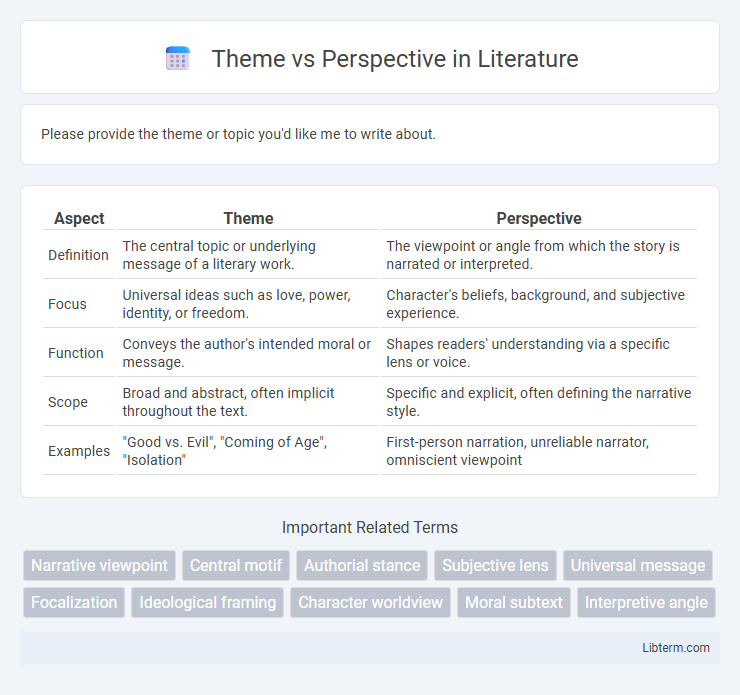Please provide the theme or topic you'd like me to write about.
Table of Comparison
| Aspect | Theme | Perspective |
|---|---|---|
| Definition | The central topic or underlying message of a literary work. | The viewpoint or angle from which the story is narrated or interpreted. |
| Focus | Universal ideas such as love, power, identity, or freedom. | Character's beliefs, background, and subjective experience. |
| Function | Conveys the author's intended moral or message. | Shapes readers' understanding via a specific lens or voice. |
| Scope | Broad and abstract, often implicit throughout the text. | Specific and explicit, often defining the narrative style. |
| Examples | "Good vs. Evil", "Coming of Age", "Isolation" | First-person narration, unreliable narrator, omniscient viewpoint |
Understanding Theme and Perspective
Understanding theme involves recognizing the central idea or underlying message that a literary work communicates, often reflecting universal truths or societal issues. Perspective relates to the viewpoint or lens through which characters, narrators, or authors interpret and present events, influencing the narrative's tone and meaning. Analyzing both theme and perspective provides deeper insight into the text's purpose and emotional impact.
Defining Theme in Literature
Theme in literature represents the underlying central idea or message that the author intends to convey, often reflecting universal truths about human nature, society, or life. It is a broad, abstract concept such as love, power, identity, or conflict that recurs throughout the narrative and informs the characters' actions and plot developments. Defining theme requires distinguishing it from plot and character by focusing on its role as the work's fundamental insight or moral lesson rather than specific events or viewpoints.
What is Perspective?
Perspective refers to the unique viewpoint or lens through which a story is narrated, shaped by a character's experiences, beliefs, and emotions. It influences how events, settings, and other characters are interpreted, providing depth and personal bias to the narrative. Unlike theme, which conveys the central message or underlying idea, perspective shapes the individual angle from which that message is explored and understood.
Key Differences Between Theme and Perspective
Theme represents the central idea or underlying message conveyed in a narrative, often reflecting universal truths or moral lessons. Perspective refers to the viewpoint or attitude through which the story is told, shaped by the narrator's or characters' experiences and biases. Key differences include that theme remains constant throughout the work, while perspective can shift depending on narrative style or character focus, influencing interpretation and emotional engagement.
How Theme Shapes a Story
Theme shapes a story by underlying its core message and guiding character development, plot progression, and setting choices. It provides a unifying thread that influences the tone and emotional impact, helping readers connect with the narrative on a deeper level. In contrast, perspective determines how the story is told, but theme drives why the story matters.
The Role of Perspective in Narrative
Perspective in narrative shapes how the theme is experienced and understood by the audience, influencing the emotional and intellectual impact of the story. The narrator's or character's viewpoint determines the framing of events, the reliability of information, and the depth of insight into the thematic elements. Varied perspectives can reveal contrasting aspects of the theme, enriching the narrative's complexity and resonance.
Identifying Theme vs. Perspective in Texts
Identifying theme in texts involves recognizing the central topic or underlying message the author conveys, such as love, freedom, or betrayal. Perspective refers to the narrator's or character's point of view, reflecting their attitudes, beliefs, and experiences that shape the narrative voice. Analyzing both theme and perspective reveals how the author's viewpoint influences the thematic expression within the text.
Examples of Theme vs. Perspective
Theme often explores universal ideas like love, betrayal, or freedom, such as in Shakespeare's "Romeo and Juliet," where the theme is tragic love. Perspective refers to the narrator's or character's viewpoint, shaping how the story is told; for instance, the first-person perspective in "The Catcher in the Rye" filters events through Holden Caulfield's personal feelings and biases. Distinguishing theme from perspective helps in literary analysis by separating the central message from the lens through which the narrative is experienced.
The Impact of Perspective on Theme
Perspective shapes the interpretation and depth of a theme by influencing how characters experience and respond to events within a narrative. Different viewpoints reveal contrasting facets of the central theme, enriching its complexity and allowing for multiple layers of meaning. For instance, a theme of justice may be perceived variably through the lens of a victim, perpetrator, or bystander, highlighting diverse moral and ethical implications.
Tips for Analyzing Theme and Perspective
Analyzing theme involves identifying the central message or underlying meaning conveyed by a text, often revealed through recurring motifs, symbols, and character development. Perspective analysis requires examining the narrator's or characters' point of view, biases, and narrative voice to understand how the story is interpreted and presented. To effectively analyze both, focus on textual evidence, consider historical and cultural contexts, and compare how theme and perspective interact to shape the overall meaning of the work.
Theme Infographic

 libterm.com
libterm.com